Storing a propane tank in a garage is not recommended due to potential fire hazards and accidental gas leaks.
Storing a propane tank in the garage may seem like a convenient solution, but it’s essential to understand the safety implications. Propane tanks, whether full or empty, can pose a serious hazard if not stored correctly.
They should be kept in a well-ventilated area, away from potential ignition sources. While it’s not illegal to store propane tanks in your garage, it’s generally discouraged due to the risk of potential gas leaks and fire hazards.
This article delves into the details, providing a comprehensive guide on the dos and don’ts of propane tank storage, ensuring your garage remains a safe and functional space.
Key takeaways:
- Storing propane tanks in the garage is not recommended
- Propane tanks should be stored in well-ventilated areas
- Keep a fire extinguisher nearby and do not attempt to repair a leaking tank
- Risks include fire hazards, explosions, and gas buildup
- Proper storage procedures and regular maintenance are crucial
Understanding Propane Tank Storage Safety
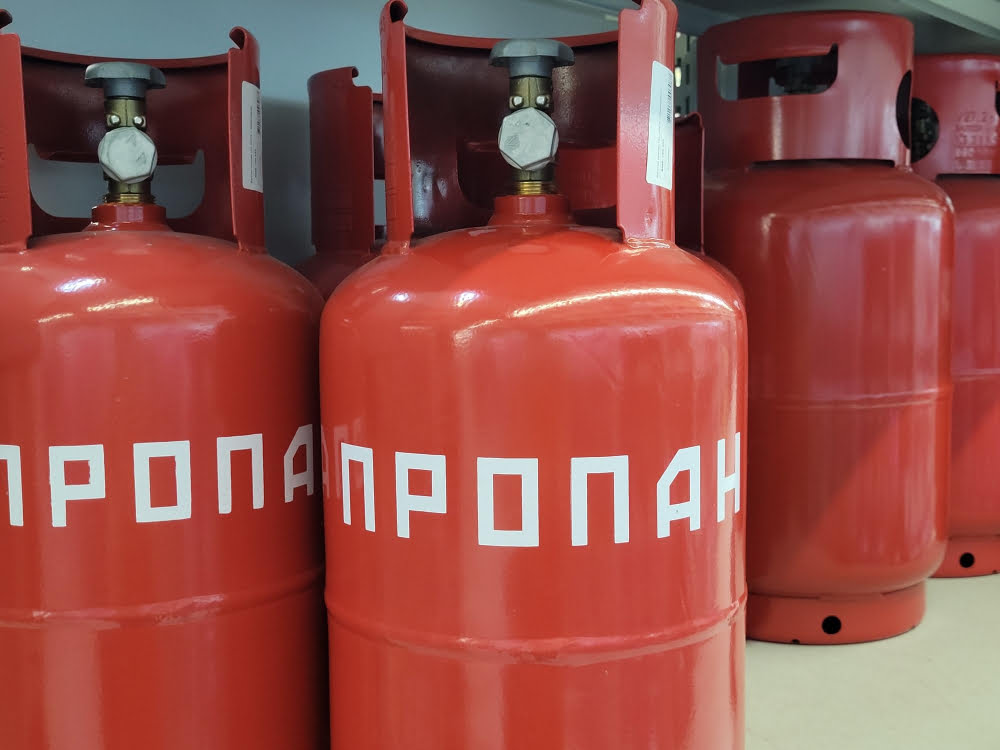
Safety is paramount when dealing with propane tanks. Propane, being a gas with high potential energy, can be hazardous if not handled with caution.
Always ensure that the tank is properly sealed to prevent accidental leakage, which can lead to fire hazards. The tanks should be placed in well-ventilated areas, preferably with easy access to the outdoors. An airy environment aids in preventing the build-up of gas in case of a slow leak.
It’s always beneficial to keep a fire extinguisher within reach, ensuring instant response to any potential fire threats. Also, never attempt to repair a leaking propane tank unless you are a qualified professional.
Risks of Storing Propane Tanks in the Garage
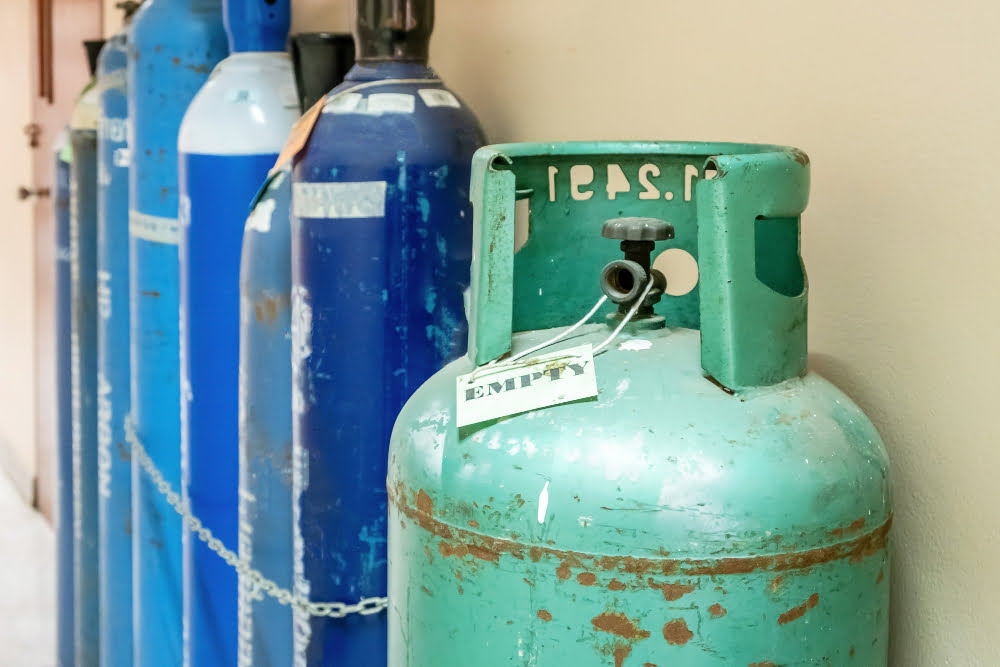
Storing propane tanks in your garage comes with inherent risks. While propane is a safe and efficient fuel when stored and used correctly, mishandling can lead to dangerous situations.
Firstly, propane is a flammable substance. Any leaks can result in a serious fire hazard, especially since garages often house many sources of ignition, including vehicles and tools.
Secondly, exposure to excessive heat can cause the pressure inside the tank to increase, leading to potential explosion—an event that could be catastrophic for your home.
Finally, poor ventilation in the garage can lead to a buildup of propane gas in the event of a leak. Prolonged exposure to these fumes can cause suffocation and other health complications.
Therefore, due diligence is crucial in managing these risks. It’s not just about safe storage, but also regular maintenance and careful handling.
Proper Procedures for Propane Tank Storage in Garage
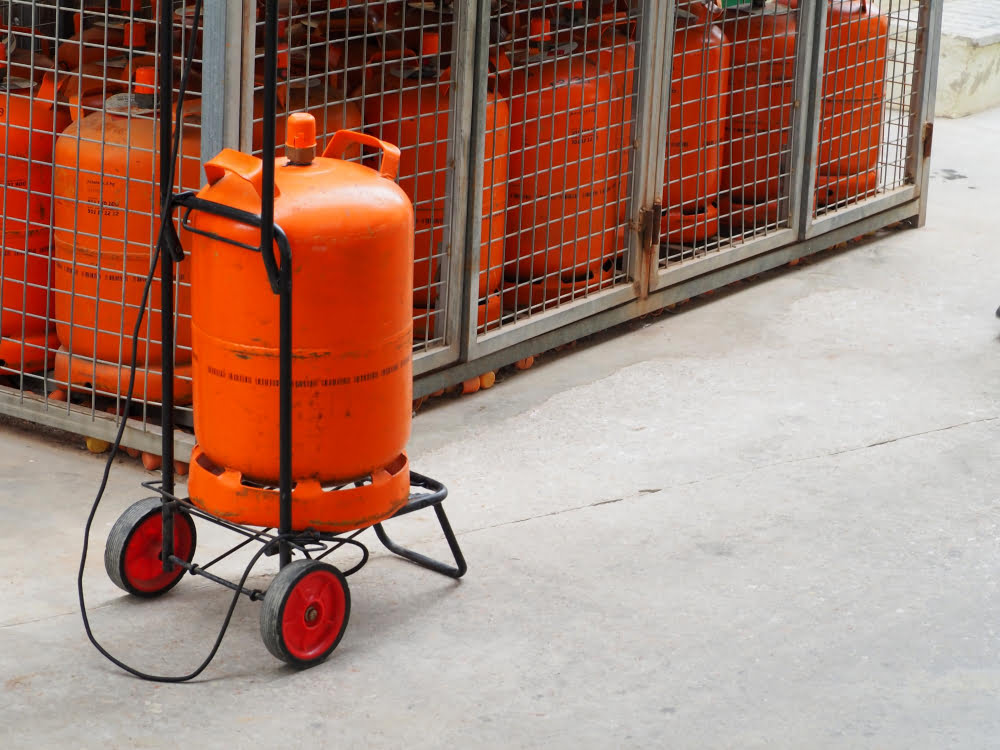
To minimize any risks, adherence to safety protocols is of utmost importance. Always store your propane tanks upright, as this protects the relief valve, allowing it to do its job if gas pressure becomes too high.
Ensure that the location is dry with ample ventilation; this reduces the chance of rusting, tank damage, and potential gas build-up. Regularly check for leaks by applying soapy water to the tank’s surface; if the soap forms bubbles, there might be a leak.
Storing tanks away from heat sources, including sunlight, goes a long way in reducing the risk of accidental ignition. Also, the tanks should be easy to access in case of emergencies but out of the reach of children. It’s beneficial to have a well-calibrated and regularly inspected fire extinguisher nearby as a part of preparation for the unlikely eventuality of fire.
Remember, clear marking of the storage spot can save precious response time in emergencies.
Critical Maintenance Tips for Propane Tank Storage
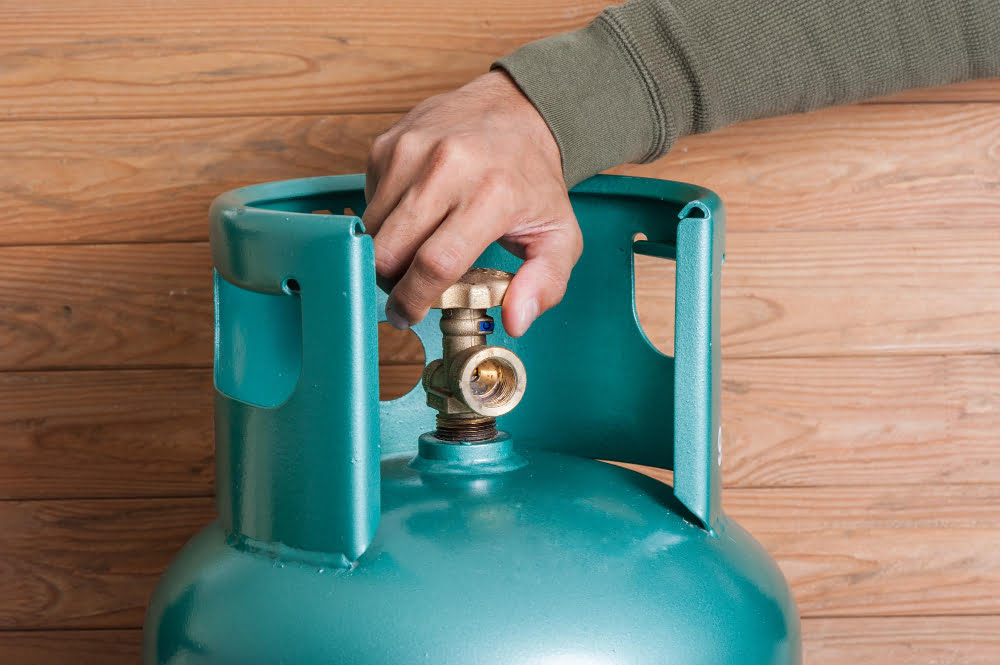
Always inspect the propane tank before placing it in storage. Look out for signs of damage such as dents or rust, as these could compromise the tank’s integrity.
Ensure the valve is tightly closed to avoid accidental leaks. It’s crucial to double-check this to prevent propane gas from building up inside the garage.
If your tank comes with a protective cap, use it. This keeps the valve secure and lessens the chance of accidental damage or impacts.
Regularly check for leaks. Apply some soapy water around the valve and regulator. If you see bubbles forming, it indicates a gas leak.
Keep the tank upright in a stable position. This position helps maintain the pressure inside and minimizes the risk of spills.
Do not cover the tank with a cloth or any form of insulation. This might lead to unnoticed leaks or mask other potential issues.
Regularly clean up the area around the storage spot. Flammable materials should be kept away from the propane tank.
Replace tanks every 10 years or so. Although propane itself doesn’t expire, tanks do. Annual inspections should be carried out by a professional for tanks older than five years.
Remember, the emphasis is always on safety when dealing with highly flammable propane. Proper maintenance is essential to avoid hazards.
Precautions to Consider When Storing Propane Tanks in Garage
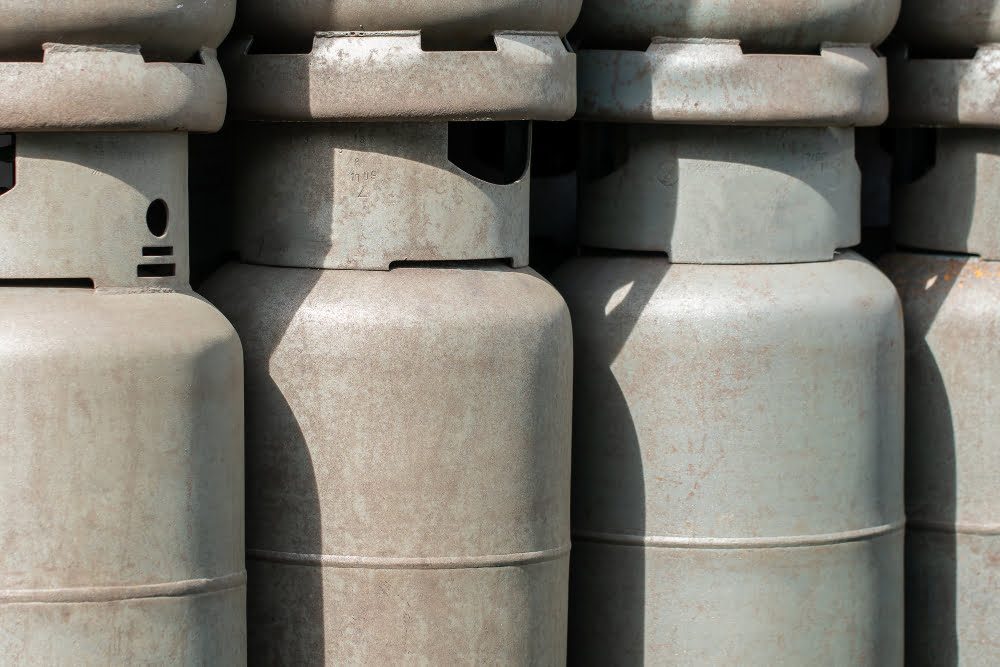
For safekeeping, ensure the propane tank is upright to avoid undue pressure on the safety valve. Utilize a secure restraint—like a safety strap—to reduce the risk of the tank tipping over.
Ventilation is also key in safeguarding against potential hazards; strive for a well-ventilated area. Propane can accumulate quickly in closed spaces, posing a risk of suffocation and combustion. Even low levels of propane can explode when exposed to an ignition source.
Avoid storing your propane tank near heat or ignition sources such as boilers, heaters, or cars. Propane tanks can rupture and potentially explode when exposed to high temperatures.
Ensure the cylinder is not damaged or rusted, as this can affect its structural integrity and safety. Regular checks and timely cylinder replacements can prevent catastrophic failures.
Know the location of your nearest fire extinguisher and ensure it’s adequately serviced regularly for emergencies.
Utilize a propane gas detector to alert you of any leaks or buildups that may occur. Alongside this, be aware of the pungent, skunk-like smell that is added to the gas to assist in identifying leaks.
Risks of Indoor Propane Storage
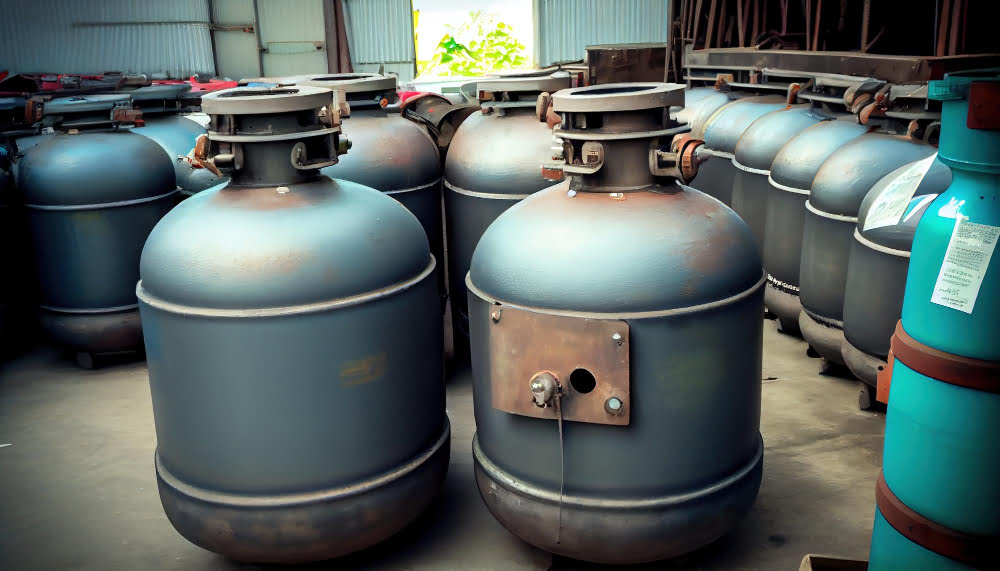
Unlike natural gas, propane is heavier than air, so it tends to pool at the bottom of whatever space it is in. In the unfortunate event of a leak, propane will remain in the low spots making it difficult to remove. In a garage, potential ignition sources like vehicles, power tools, or water heaters can easily ignite this gas, leading to a damaging, even potentially lethal explosion.
Moreover, indoor storage could expose the propane tank to temperature fluctuations that can create stress on the tank’s materials, increasing the risk of a leak. Due to its flammable nature, a small propane leak could result in a significant fire hazard.
A critical risk involves inhalation – a propane leak in a poorly ventilated garage could lead to dangerous levels of gas in the air, replacing oxygen and leading to asphyxiation. This risk is increased with the common lack of air circulation found in garages.
Remember, propane tanks are pressure vessels. If mishandled or subject to damage, they can pose significant harm, especially when stored indoors. Bear in mind that smaller propane cylinders used for grills are not designed for indoor storage either. Safety is the utmost priority.
What Not to Do When Storing Propane Tanks in a Garage
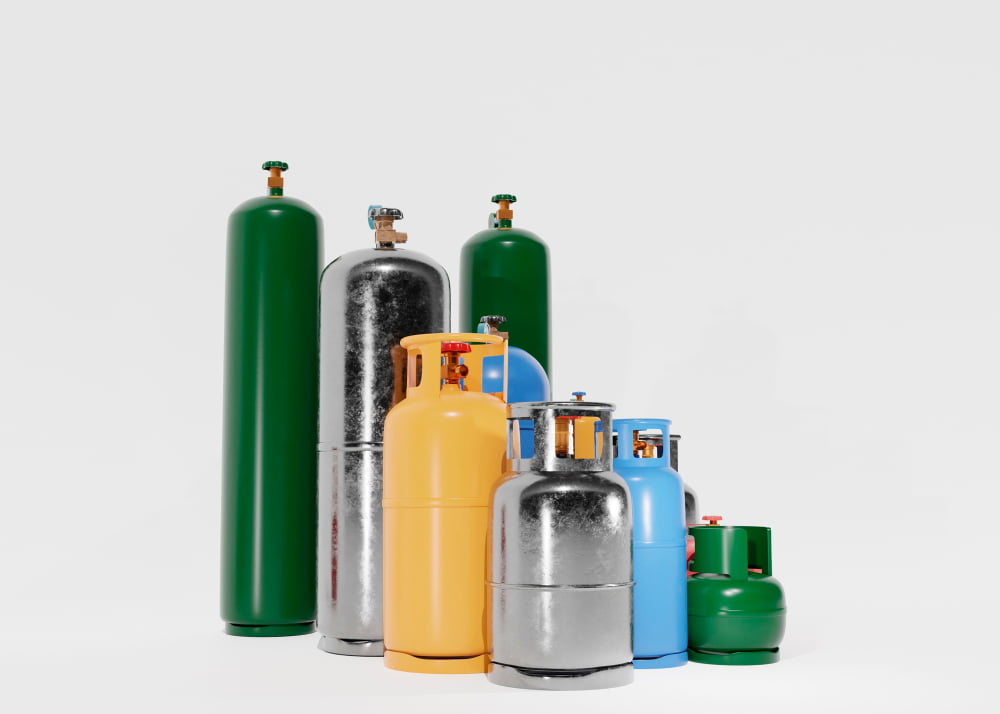
Never place the propane tanks near open flames, including pilot lights. This arrangement could ignite the tank, leading to potentially disastrous results.
Avoid storing tanks in enclosed spaces without sufficient ventilation. Propane can build up over time, increasing the risk of an explosion.
Do not expose the tanks to extreme heat or direct sunlight as this could increase the pressure in the tank, making it more likely to rupture.
Steer clear of storing propane tanks on their sides. Always store them in an upright position to prevent the pressure relief valve from being blocked.
Keep the tanks away from heavy, moving objects or areas with high vehicle traffic. Accidental impact can cause leaks, which are dangerous in a confined space like a garage.
Resist the temptation to paint the tank a dark color. Dark colors absorb more heat, which could raise the pressure inside the tank.
Lastly, refrain from storing the tank in damp areas of the garage. Propane tanks are prone to rusting which can lead to leakage over time.
FAQ
Is it safe to store a 20 lb propane tank in the garage?
Storing a 20 lb propane tank in the garage is not safe due to the risk of vapors escaping and concentrating indoors if a valve isn’t fully closed.
Can propane be stored in garage for winter?
No, propane should not be stored in a garage during winter due to the need for open ventilation and to avoid potential danger.
How do you store propane tanks at home?
Propane tanks should be stored upright on a flat surface, ideally within a waterproof cover or certified tank box, to prevent rust, tank damage, and ensure the over-pressure vent interacts effectively with the vapor.
Can you store propane tanks outside in the heat?
Yes, you can store propane tanks outside in the heat, provided they are placed on a flat, solid surface and in a shaded area to prevent them from reaching unsafe temperatures of over 120 °F (49 °C).
What precautions should be taken when storing propane tanks in the garage?
When storing propane tanks in the garage, ensure they’re well-ventilated, upright, at room-temperature, away from heat sources and flammables, and out of reach of children and pets.
Is there an ideal temperature range for storing propane tanks outdoor?
Yes, propane tanks should be stored outdoors in a temperature range between -20°F and 120°F.
Can propane tanks be safely stored in a detached garage?
Yes, propane tanks can be safely stored in a detached garage as long as they are kept in an upright position, away from sources of heat and ignition, and in accordance with local safety regulations.